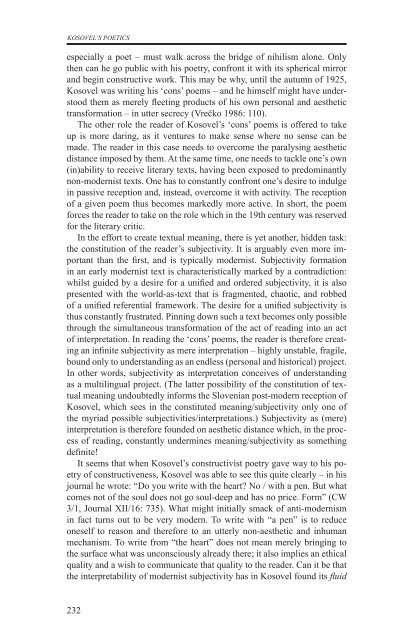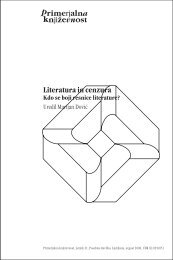razprave (pdf) - Društvo za primerjalno književnost - ZRC SAZU
razprave (pdf) - Društvo za primerjalno književnost - ZRC SAZU
razprave (pdf) - Društvo za primerjalno književnost - ZRC SAZU
- No tags were found...
Create successful ePaper yourself
Turn your PDF publications into a flip-book with our unique Google optimized e-Paper software.
KOSOVEL’s poeticsespecially a poet – must walk across the bridge of nihilism alone. Onlythen can he go public with his poetry, confront it with its spherical mirrorand begin constructive work. This may be why, until the autumn of 1925,Kosovel was writing his ‘cons’ poems – and he himself might have understoodthem as merely fleeting products of his own personal and aesthetictransformation – in utter secrecy (Vrečko 1986: 110).The other role the reader of Kosovel’s ‘cons’ poems is offered to takeup is more daring, as it ventures to make sense where no sense can bemade. The reader in this case needs to overcome the paralysing aestheticdistance imposed by them. At the same time, one needs to tackle one’s own(in)ability to receive literary texts, having been exposed to predominantlynon-modernist texts. One has to constantly confront one’s desire to indulgein passive reception and, instead, overcome it with activity. The receptionof a given poem thus becomes markedly more active. In short, the poemforces the reader to take on the role which in the 19th century was reservedfor the literary critic.In the effort to create textual meaning, there is yet another, hidden task:the constitution of the reader’s subjectivity. It is arguably even more importantthan the first, and is typically modernist. Subjectivity formationin an early modernist text is characteristically marked by a contradiction:whilst guided by a desire for a unified and ordered subjectivity, it is alsopresented with the world-as-text that is fragmented, chaotic, and robbedof a unified referential framework. The desire for a unified subjectivity isthus constantly frustrated. Pinning down such a text becomes only possiblethrough the simultaneous transformation of the act of reading into an actof interpretation. In reading the ‘cons’ poems, the reader is therefore creatingan infinite subjectivity as mere interpretation – highly unstable, fragile,bound only to understanding as an endless (personal and historical) project.In other words, subjectivity as interpretation conceives of understandingas a multilingual project. (The latter possibility of the constitution of textualmeaning undoubtedly informs the Slovenian post-modern reception ofKosovel, which sees in the constituted meaning/subjectivity only one ofthe myriad possible subjectivities/interpretations.) Subjectivity as (mere)interpretation is therefore founded on aesthetic distance which, in the processof reading, constantly undermines meaning/subjectivity as somethingdefinite!It seems that when Kosovel’s constructivist poetry gave way to his poetryof constructiveness, Kosovel was able to see this quite clearly – in hisjournal he wrote: “Do you write with the heart? No / with a pen. But whatcomes not of the soul does not go soul-deep and has no price. Form” (CW3/1, Journal XII/16: 735). What might initially smack of anti-modernismin fact turns out to be very modern. To write with “a pen” is to reduceoneself to reason and therefore to an utterly non-aesthetic and inhumanmechanism. To write from “the heart” does not mean merely bringing tothe surface what was unconsciously already there; it also implies an ethicalquality and a wish to communicate that quality to the reader. Can it be thatthe interpretability of modernist subjectivity has in Kosovel found its fluid232
















